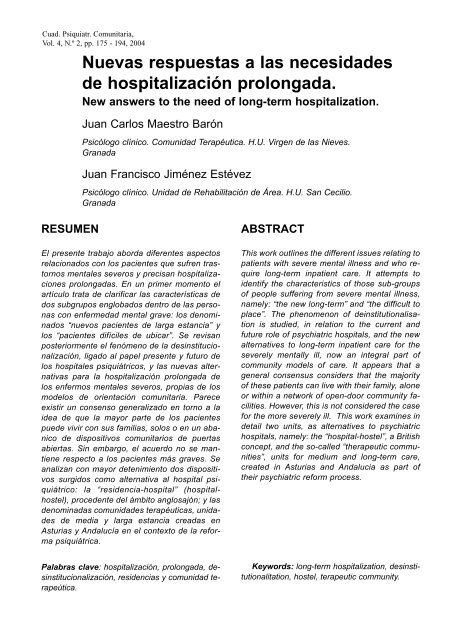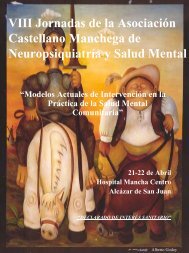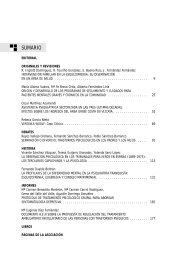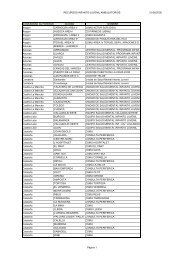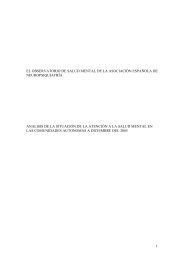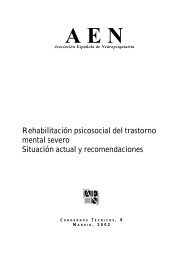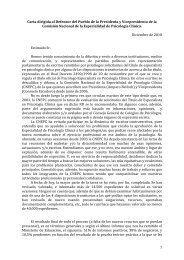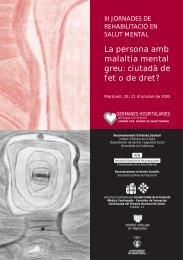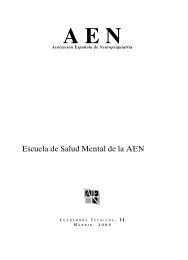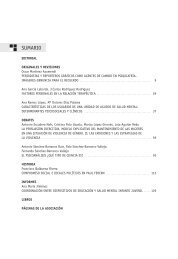Vol 4. Nº 2. 2004 - Asociación Española de Neuropsiquiatría
Vol 4. Nº 2. 2004 - Asociación Española de Neuropsiquiatría
Vol 4. Nº 2. 2004 - Asociación Española de Neuropsiquiatría
You also want an ePaper? Increase the reach of your titles
YUMPU automatically turns print PDFs into web optimized ePapers that Google loves.
Cuad. Psiquiatr. Comunitaria,<strong>Vol</strong>. 4, N.º 2, pp. 175 - 194, <strong>2004</strong>Nuevas respuestas a las necesida<strong>de</strong>s<strong>de</strong> hospitalización prolongada.New answers to the need of long-term hospitalization.Juan Carlos Maestro BarónPsicólogo clínico. Comunidad Terapéutica. H.U. Virgen <strong>de</strong> las Nieves.GranadaJuan Francisco Jiménez EstévezPsicólogo clínico. Unidad <strong>de</strong> Rehabilitación <strong>de</strong> Área. H.U. San Cecilio.GranadaRESUMENABSTRACTEl presente trabajo aborda diferentes aspectosrelacionados con los pacientes que sufren trastornosmentales severos y precisan hospitalizacionesprolongadas. En un primer momento elartículo trata <strong>de</strong> clarificar las características <strong>de</strong>dos subgrupos englobados <strong>de</strong>ntro <strong>de</strong> las personascon enfermedad mental grave: los <strong>de</strong>nominados“nuevos pacientes <strong>de</strong> larga estancia” ylos “pacientes difíciles <strong>de</strong> ubicar”. Se revisanposteriormente el fenómeno <strong>de</strong> la <strong>de</strong>sinstitucionalización,ligado al papel presente y futuro <strong>de</strong>los hospitales psiquiátricos, y las nuevas alternativaspara la hospitalización prolongada <strong>de</strong>los enfermos mentales severos, propias <strong>de</strong> losmo<strong>de</strong>los <strong>de</strong> orientación comunitaria. Pareceexistir un consenso generalizado en torno a lai<strong>de</strong>a <strong>de</strong> que la mayor parte <strong>de</strong> los pacientespue<strong>de</strong> vivir con sus familias, solos o en un abanico<strong>de</strong> dispositivos comunitarios <strong>de</strong> puertasabiertas. Sin embargo, el acuerdo no se mantienerespecto a los pacientes más graves. Seanalizan con mayor <strong>de</strong>tenimiento dos dispositivossurgidos como alternativa al hospital psiquiátrico:la “resi<strong>de</strong>ncia-hospital” (hospitalhostel),proce<strong>de</strong>nte <strong>de</strong>l ámbito anglosajón; y las<strong>de</strong>nominadas comunida<strong>de</strong>s terapéuticas, unida<strong>de</strong>s<strong>de</strong> media y larga estancia creadas enAsturias y Andalucía en el contexto <strong>de</strong> la reformapsiquiátrica.This work outlines the different issues relating topatients with severe mental illness and who requirelong-term inpatient care. It attempts toi<strong>de</strong>ntify the characteristics of those sub-groupsof people suffering from severe mental illness,namely: “the new long-term” and “the difficult toplace”. The phenomenon of <strong>de</strong>institutionalisationis studied, in relation to the current andfuture role of psychiatric hospitals, and the newalternatives to long-term inpatient care for theseverely mentally ill, now an integral part ofcommunity mo<strong>de</strong>ls of care. It appears that ageneral consensus consi<strong>de</strong>rs that the majorityof these patients can live with their family, aloneor within a network of open-door community facilities.However, this is not consi<strong>de</strong>red the casefor the more severely ill. This work examines in<strong>de</strong>tail two units, as alternatives to psychiatrichospitals, namely: the “hospital-hostel”, a Britishconcept, and the so-called “therapeutic communities”,units for medium and long-term care,created in Asturias and Andalucia as part oftheir psychiatric reform process.Palabras clave: hospitalización, prolongada, <strong>de</strong>sinstitucionalización,resi<strong>de</strong>ncias y comunidad terapeútica.Keywords: long-term hospitalization, <strong>de</strong>sinstitutionalitation,hostel, terapeutic community.


